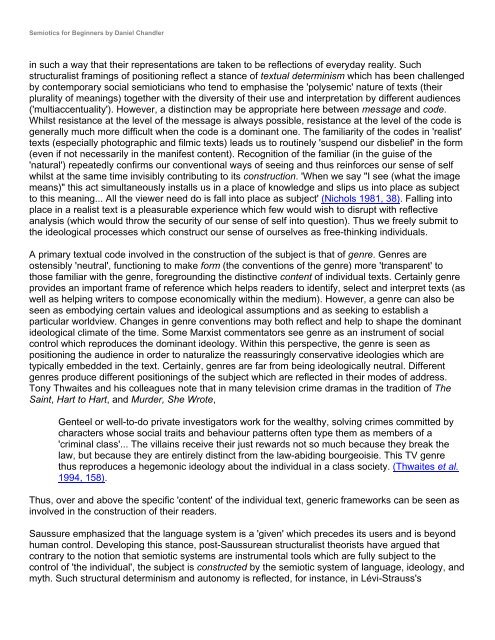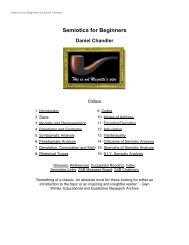Semiotics for Beginners by Daniel Chandler
Semiotics for Beginners by Daniel Chandler
Semiotics for Beginners by Daniel Chandler
Create successful ePaper yourself
Turn your PDF publications into a flip-book with our unique Google optimized e-Paper software.
<strong>Semiotics</strong> <strong>for</strong> <strong>Beginners</strong> <strong>by</strong> <strong>Daniel</strong> <strong>Chandler</strong><br />
in such a way that their representations are taken to be reflections of everyday reality. Such<br />
structuralist framings of positioning reflect a stance of textual determinism which has been challenged<br />
<strong>by</strong> contemporary social semioticians who tend to emphasise the 'polysemic' nature of texts (their<br />
plurality of meanings) together with the diversity of their use and interpretation <strong>by</strong> different audiences<br />
('multiaccentuality'). However, a distinction may be appropriate here between message and code.<br />
Whilst resistance at the level of the message is always possible, resistance at the level of the code is<br />
generally much more difficult when the code is a dominant one. The familiarity of the codes in 'realist'<br />
texts (especially photographic and filmic texts) leads us to routinely 'suspend our disbelief' in the <strong>for</strong>m<br />
(even if not necessarily in the manifest content). Recognition of the familiar (in the guise of the<br />
'natural') repeatedly confirms our conventional ways of seeing and thus rein<strong>for</strong>ces our sense of self<br />
whilst at the same time invisibly contributing to its construction. 'When we say "I see (what the image<br />
means)" this act simultaneously installs us in a place of knowledge and slips us into place as subject<br />
to this meaning... All the viewer need do is fall into place as subject' (Nichols 1981, 38). Falling into<br />
place in a realist text is a pleasurable experience which few would wish to disrupt with reflective<br />
analysis (which would throw the security of our sense of self into question). Thus we freely submit to<br />
the ideological processes which construct our sense of ourselves as free-thinking individuals.<br />
A primary textual code involved in the construction of the subject is that of genre. Genres are<br />
ostensibly 'neutral', functioning to make <strong>for</strong>m (the conventions of the genre) more 'transparent' to<br />
those familiar with the genre, <strong>for</strong>egrounding the distinctive content of individual texts. Certainly genre<br />
provides an important frame of reference which helps readers to identify, select and interpret texts (as<br />
well as helping writers to compose economically within the medium). However, a genre can also be<br />
seen as embodying certain values and ideological assumptions and as seeking to establish a<br />
particular worldview. Changes in genre conventions may both reflect and help to shape the dominant<br />
ideological climate of the time. Some Marxist commentators see genre as an instrument of social<br />
control which reproduces the dominant ideology. Within this perspective, the genre is seen as<br />
positioning the audience in order to naturalize the reassuringly conservative ideologies which are<br />
typically embedded in the text. Certainly, genres are far from being ideologically neutral. Different<br />
genres produce different positionings of the subject which are reflected in their modes of address.<br />
Tony Thwaites and his colleagues note that in many television crime dramas in the tradition of The<br />
Saint, Hart to Hart, and Murder, She Wrote,<br />
Genteel or well-to-do private investigators work <strong>for</strong> the wealthy, solving crimes committed <strong>by</strong><br />
characters whose social traits and behaviour patterns often type them as members of a<br />
'criminal class'... The villains receive their just rewards not so much because they break the<br />
law, but because they are entirely distinct from the law-abiding bourgeoisie. This TV genre<br />
thus reproduces a hegemonic ideology about the individual in a class society. (Thwaites et al.<br />
1994, 158).<br />
Thus, over and above the specific 'content' of the individual text, generic frameworks can be seen as<br />
involved in the construction of their readers.<br />
Saussure emphasized that the language system is a 'given' which precedes its users and is beyond<br />
human control. Developing this stance, post-Saussurean structuralist theorists have argued that<br />
contrary to the notion that semiotic systems are instrumental tools which are fully subject to the<br />
control of 'the individual', the subject is constructed <strong>by</strong> the semiotic system of language, ideology, and<br />
myth. Such structural determinism and autonomy is reflected, <strong>for</strong> instance, in Lévi-Strauss's




